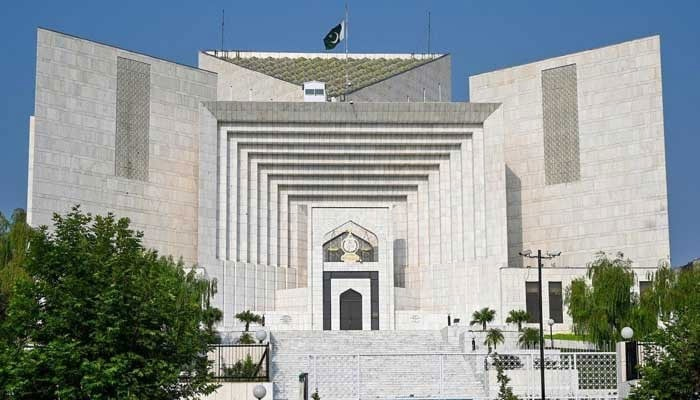SC issues detailed ruling on civilians’ trial in mly courts
Bench comprised Justice Munib Akhtar, Justice Yahya Afridi, Justice Mazahir Ali Akbar Naqvi and Justice Ayesha A Malik
ISLAMABAD: A five-member larger bench of the Supreme Court — headed by Justice Ijazul Ahsen — issued a detailed judgment on the petitions challenging the trial of civilians in the military courts.
The bench comprised Justice Munib Akhtar, Justice Yahya Afridi, Justice Mazahir Ali Akbar Naqvi and Justice Ayesha A Malik. The court held that the manner in which around 103 persons were dealt with was contrary to the law and hence a violation of articles 9 and 10A of the Constitution.
Last year on October 23, the court had declared the trial of civilians in the military courts as unconstitutional and held that 103 persons and others who may be placed in relation to the events arising from May 9th and 10th May could be tried by Criminal Courts established under the ordinary or special law of the land.
The 25-page detailed judgment, written by Justice Muneeb Akhtar, has the majority decision of four judges. Justice Muneeb Akhtar begins the judgment with the words of British judge Lord Atkin from one of his most well-known speech delivered in 1941.
The British judge said in England, even amid the clash of arms, the laws were not silent, they spoke the same language in peace and in war.
The detailed judgment also includes an additional 48-page note by Justice Ayesha Malik. Justice Ayesha held that the offences under the Official Secrets Act were triable before the ordinary criminal courts, which guarantees fair trial, due process and independence as mandated by the Constitution. However, none of the 103 persons detained were reported for offences under the said Act. “Yet applications were made under Section 549 of the Code of Criminal Procedure, 1898 (Cr.P.C.), for their delivery to military authorities.
“It goes without saying that the facts in these Petitions are unique and unfortunate, however, they do not justify the trial of civilians before a military court for offences which can be tried before ordinary courts which have the protection of Article 175 of the Constitution. If the ordinary or special courts are unable to meet the challenges of trying the civilians detained in these cases, then the solution is to make an effort to strengthen the system.
“Relying on military courts on the ground that the ordinary courts are neither effective nor efficient reflects poorly on the State and the government whose primary responsibility is to maintain the rule of law and to ensure a strong and effective justice sector for the people.”
The judge noted that the Federation cannot blame a system it was responsible for and thereafter subject citizens to a system that violates their fundamental rights.
Justice Yahya Afridi, who had reserved his note on the short order in his separate note, said when they examined the facts of the case in light of principles, they found that the trial of civilians involved in the incident of the 9th and 10 of May 23 may be proceeded strictly under the relevant criminal laws applicable to civilians, but there is nothing on record to even suggest that they so acted with the intention or object of causing damage to the defence of Pakistan or that their alleged acts relate to such work or affair of the armed forces which form an integral part of the core function of defending Pakistan against external aggression or threat of war so as to come within the preview of Section 2(1)(d)(ii) of the Army Act. The judgment says the amendment about civilian trials in military courts was removed in 2019 and the matter of trial was not just confined to 103 individuals.
-
 Climate Nearing Dangerous Tipping Points, Study Shows
Climate Nearing Dangerous Tipping Points, Study Shows -
 James Van Der Beek, 'Dawson's Creek' Star, Dies At 48
James Van Der Beek, 'Dawson's Creek' Star, Dies At 48 -
 Threads Launches Dear Algo AI Feature To Personalise Feeds In Real Time
Threads Launches Dear Algo AI Feature To Personalise Feeds In Real Time -
 Police Take Action Over Andrew's Ties With Jeffrey Epstein While In UK Office
Police Take Action Over Andrew's Ties With Jeffrey Epstein While In UK Office -
 Courtney Love Makes First Appearance Since New Report On Kurt Cobain's Death
Courtney Love Makes First Appearance Since New Report On Kurt Cobain's Death -
 King Charles Anxious As Uncertainty Grows Over Sarah Ferguson’s Next Move
King Charles Anxious As Uncertainty Grows Over Sarah Ferguson’s Next Move -
 Real Reason Kim Kardashian Is Dating Lewis Hamilton
Real Reason Kim Kardashian Is Dating Lewis Hamilton -
 Rihanna Leaves Elderly Woman Star-struck In Viral Grocery Store Video
Rihanna Leaves Elderly Woman Star-struck In Viral Grocery Store Video -
 TikTok US Launches Local Feed Using Precise Location Data
TikTok US Launches Local Feed Using Precise Location Data -
 Jill Biden’s Former Husband Charged With Wife’s Murder
Jill Biden’s Former Husband Charged With Wife’s Murder -
 Zayn Malik Reveals Parenting Decision Gigi Hadid Criticized Him Over
Zayn Malik Reveals Parenting Decision Gigi Hadid Criticized Him Over -
 Palace Releases Prince William's Photos From Final Day Of His Saudi Arabia Visit
Palace Releases Prince William's Photos From Final Day Of His Saudi Arabia Visit -
 Microsoft Warns Of AI Double Agents As Enterprise Adoption Of AI Agents Surges
Microsoft Warns Of AI Double Agents As Enterprise Adoption Of AI Agents Surges -
 Kate Middleton, Prince William Break Silence Over Tragic Shooting In Canada
Kate Middleton, Prince William Break Silence Over Tragic Shooting In Canada -
 'Finding Her Edge' Star Madelyn Keys Explains Adriana's Remarks About Brayden Romance
'Finding Her Edge' Star Madelyn Keys Explains Adriana's Remarks About Brayden Romance -
 Royal Expert Raises Questions Over Sarah Ferguson's 'plotting' Stunning Comeback
Royal Expert Raises Questions Over Sarah Ferguson's 'plotting' Stunning Comeback




